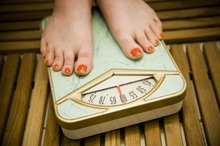The Side-Effects of Lack of Calories
There are a variety of reasons people eat too few calories, including eating disorders, excessive athletic training, crash dieting and even senior citizens with reduced appetites. In addition to malnutrition, severely restricting caloric intake can take a toll on your normal bodily functions and lead to health problems. To stay healthy and stave off disease, don’t stay on a low-calorie diet more than a few days and consult your health care provider if you’re not able to consume enough calories to fuel your body’s energy requirements.
Identification
The calories you consume fall into one of two groups, those you need to stay alive and those needed for physical activity. To determine your BMR, multiply your ideal body weight by 10, meaning that a woman weighting 150 lbs. would need 1,500 calories per day. Add 200 to 400 calories per hour of exercise, depending upon intensity.
- The calories you consume fall into one of two groups, those you need to stay alive and those needed for physical activity.
- To determine your BMR, multiply your ideal body weight by 10, meaning that a woman weighting 150 lbs.
Gallstones
What Are the Causes of Elevated Liver Enzymes in Anorexia?
Learn More
Eating too few calories over time can lead to rapid weight loss. Although this may sound ideal to those who are overweight, losing a large amount of weight in a short time can increase cholesterol levels in your gallbladder and decrease its ability to excrete bile. This can lead to the formation of gallstones, hardened deposits of digestive fluid in your gallbladder characterized by severe pain, yellowed skin and a high fever and chills.
Immunity
Severe calorie restriction may cause an iron deficiency and low protein levels that affect your immune system’s ability to fight off colds and the flu and more serious illnesses. A report published in 2000 in “Medicine and Science in Sports and Exercise” noted that many athletes consume 25 percent fewer calories than they should, which increases inflammation and decreases anti-inflammatory immune factors. Increasing caloric and dietary fat intake to match energy expenditure reverses the negative effects on immune function.
Menstruation and Pregnancy
Recommended Daily Calories for a Seven-Year-Old
Learn More
When women eat too few calories, it often leads to irregular menstrual periods or even causes periods to stop altogether. When menses stop, your risk of bone loss climbs due to a lack of estrogen and poor nutrition including low levels of calcium, increasing the risk for osteoporosis and broken bones. Women who eat too few calories during pregnancy can increase the chances their babies will experience delayed growth and development, have damaged organs and be prone to obesity in later life 2.
Metabolism and Weight Loss
Although it may seem counterintuitive, eating too few calories can make your body think it’s in starvation mode and actually lose metabolism-boosting muscle and hold onto fat intead, sabotaging your weight-loss efforts. It causes your metabolism slow down overall and can make it harder to lose weight in the future.
Other Effects
If your body goes into starvation mode from eating too few calories for too long a period of time, it can cause:
- abnormally low blood pressure
- heart rhythm problems
- hair loss
- brittle fingernails
- trouble concentrating
- loss of coordination
- decreased muscular strength
- anemia
- joint swelling
Your thyroid may also be affected, and you may feel cold all the time, with lower energy levels and increased depression.
Related Articles
References
- “The Telegraph”; Women Who Eat Too Little During Pregnancy Increase Risk of Obesity in Children; Richard Gray; September 2008
- U.S. Department of Health and Human Services and U.S. Department of Agriculture. 2015–2020 Dietary Guidelines for Americans. 8th Edition. December 2015.
- Hall KD, Chow CC. Why is the 3500 kcal per pound weight loss rule wrong?. Int J Obes (Lond). 2013;37(12):1614. doi:10.1038%2Fijo.2013.112
Resources
- “Archives of Internal Medicine”; Bone Mineral Density Response...; D.T. Villareal, et al.; 2006
- “Medicine & Science in Sports & Exercise”; Dietary Fats and Immune Status; J. Venkatraman; 2000
- Ask Dr. Sears; Pregnancy and Childbirth; William Sears, M.D.; 2006
- SportsDoctor.com: How Many Calories a Day Do I Need to Maintain My Ideal Body Weight?
Writer Bio
Bonnie Singleton has been writing professionally since 1996. She has written for various newspapers and magazines including "The Washington Times" and "Woman's World." She also wrote for the BBC-TV news magazine "From Washington" and worked for Discovery Channel online for more than a decade. Singleton holds a master's degree in musicology from Florida State University and is a member of the American Independent Writers.









